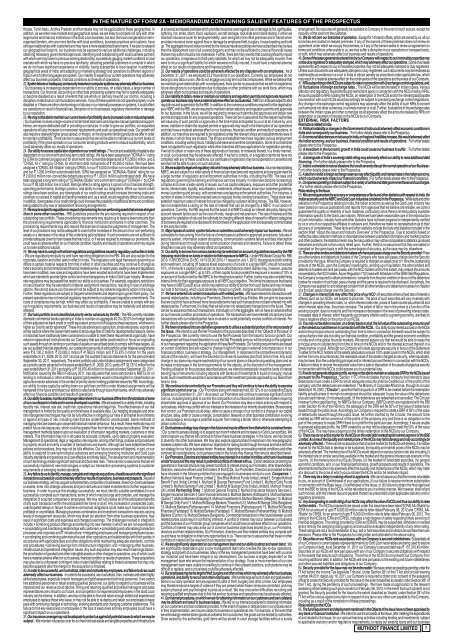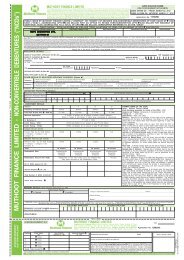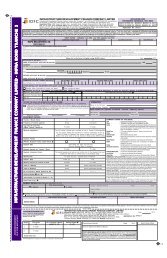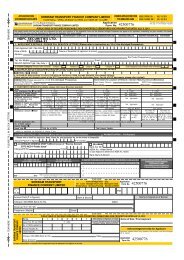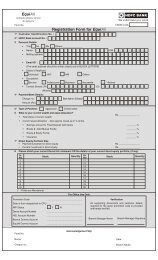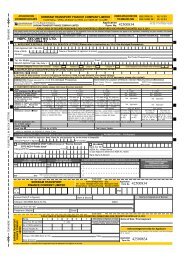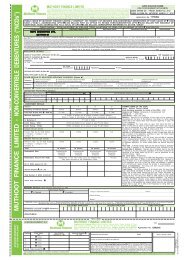NON-CONVERTIBLE
MUTHOOT FINANCE LIMITED - HDFC Bank
MUTHOOT FINANCE LIMITED - HDFC Bank
- No tags were found...
You also want an ePaper? Increase the reach of your titles
YUMPU automatically turns print PDFs into web optimized ePapers that Google loves.
7IN THE NATURE OF FORM 2A - MEMORANDUM CONTAINING SALIENT FEATURES OF THE PROSPECTUSMUTHOOT FINANCE LIMITEDKerala, Tamil Nadu, Andhra Pradesh and Karnataka may not be applicable to these geographies. Inaddition, as we enter new markets and geographical areas, we are likely to compete not only with otherlarge banks and financial institutions in the Gold Loan business, but also the local unorganised or semiorganisedlenders, who are more familiar with local conditions, business practices and customs, havestronger relationships with customers and may have a more established brand name. If we plan to expandour geographical footprint, our business may be exposed to various additional challenges, includingobtaining necessary governmental approvals, identifying and collaborating with local business partnerswith whom we may have no previous working relationship; successfully gauging market conditions in localmarkets with which we have no previous familiarity; attracting potential customers in a market in whichwe do not have significant experience or visibility; being susceptible to local taxation in additionalgeographical areas of India; and adapting our marketing strategy and operations to different regions ofIndia in which other languages are spoken. Our inability to expand our current operations may adverselyaffect our business prospects, financial conditions and results of operations.22. System failures or inadequacy and security breaches in computer systems may adversely affect our business.: Our business is increasingly dependent on our ability to process, on a daily basis, a large number oftransactions. Our financial, accounting or other data processing systems may fail to operate adequatelyor become disabled as a result of events that are wholly or partially beyond our control, including adisruption of electrical or communications services. If any of these systems do not operate properly or aredisabled or if there are other shortcomings or failures in our internal processes or systems, it could affectour operations or result in financial loss, disruption of our businesses, regulatory intervention or damageto our reputation.23. We may not be able to maintain our current levels of profitability due to increased costs or reduced spreads.: Our business involves a large volume of small-ticket size loans and requires manual operational support.Hence, we require dedicated staff or providing our services. In order to grow our portfolio, our expandedoperations will also increase our manpower requirements and push up operational costs. Our growth willalso require a relatively higher gross spread, or margin, on the consumer lending products we offer in orderto maintain profitability. There can be no assurance that we will be able to maintain our current levels ofprofitability if the gross spreads on our consumer lending products were to reduce substantially, whichcould adversely affect our results of operations.24. Our ability to access capital also depends on our credit ratings. : The cost and availability of capital is alsodependent on our short-term and long-term credit ratings. We have been assigned an ”[ICRA]A1+” ratingby ICRA for commercial paper and for short-term non-convertible debentures of ` 2,000.0 million, and a“CRISIL A1+” rating by CRISIL for short term debt instruments of ` 40,000.0 million. We have beenassigned a “CRISIL AA-/Stable” rating by CRISIL for our ` 5,000.0 million non-convertible debenturesand our ` 1,000.0 million subordinated debt. ICRA has assigned an ”[ICRA]AA-/Stable” rating for our` 2,000.0 million non-convertible debentures and our ` 1,000.0 million subordinated debt. We havebeen assigned a long-term rating of “[ICRA]AA-/Stable” and a short-term rating of “[ICRA]A1+” by ICRAfor our ` 93,530 million line of credit. Ratings reflect a rating agency’s opinion of our financial strength,operating performance, strategic position, and ability to meet our obligations. While our recent creditratings have been positive, any downgrade of our credit ratings would increase borrowing costs andconstrain our access to capital and lending markets and, as a result, would negatively affect our business.In addition, downgrades of our credit ratings could increase the possibility of additional terms and conditionsbeing added to any new or replacement financing arrangements.25. We may be subject to regulations in respect of provisioning for non-performing assets that are less stringentthan in some other countries. : RBI guidelines prescribe the provisioning required in respect of ouroutstanding loan portfolio. These provisioning requirements may require us to reserve lower amounts thanthe provisioning requirements applicable to financial institutions and banks in other countries. Theprovisioning requirements may also require the exercise of subjective judgments of management. Thelevel of our provisions may not be adequate to cover further increases in the amount of our non-performingassets or a decrease in the value of the underlying gold collateral. If such provisions are not sufficient toprovide adequate cover for loan losses that may occur, or if we are required to increase our provisions, thiscould have an adverse effect on our financial condition, liquidity and results of operations and may requireus to raise additional capital.26. We may have to comply with stricter regulations and guidelines issued by regulatory authorities in India.: We are regulated principally by and have reporting obligations to the RBI. We are also subject to thecorporate, taxation and other laws in effect in India. The regulatory and legal framework governing usdiffers in certain material respects from that in effect in other countries and may continue to change asIndia’s economy and commercial and financial markets evolve. In recent years, existing rules and regulationshave been modified, new rules and regulations have been enacted and reforms have been implementedwhich are intended to provide tighter control and more transparency in India’s Gold Loan industry. Moreover,new regulations may be passed that restrict our ability to do business. For example, regulatory restrictionson securitisation may be extended to bilateral assignment transactions, resulting in loss of arbitrageoptions. We cannot assure you that we will not be subject to any adverse regulatory action in the future.Further, these regulations are subject to frequent amendments and depend upon government policy. Ourpresent operations may not meet all regulatory requirements or subsequent regulatory amendments. Thecosts of compliance may be high, which may affect our profitability. If we are unable to comply with anysuch regulatory requirements, our business and results of operations may be materially and adverselyaffected.27. Our loan portfolio is not classified as priority sector advances by the RBI. : The RBI currently mandatesdomestic commercial banks operating in India to maintain an aggregate 40.0% (32.0% for foreign banks)of their adjusted net bank credit or credit equivalent amount of off-balance sheet exposure, whichever ishigher as “priority sector advances”. These include advances to agriculture, small enterprises, exports andsimilar sectors where the Government seeks to encourage flow of credit for developmental reasons. Banksin India that have traditionally been constrained or unable to meet these requirements organically, haverelied on specialised institutions like our Company that are better positioned to or focus on originatingsuch assets through on-lending or purchase of assets or securitised pools to comply with these targets. Asper our audited financial statements, our outstanding amounts of sold portfolio under bilateral assignmentswere ` 8,130.2 million, ` 20,083.2 million,` 41,863.9 million and ` 25,875.0 million for the yearsended March 31, 2009, 2010, 2011 and as per the audited financial statements for the period endedSeptember 30, 2011, respectively. The entire portfolio sold under bilateral assignments were categorisedas a priority sector advance for the years ended March 31, 2009, 2010, partly of ` 33,737.0 million for theyear ended March 31,2011 and partly of ` 18,970.40 million for the period ended September 30, 2011.Notification issued by the RBI in February 2011, has stipulated that loans sanctioned to NBFCs for onlending to individuals or other entities against gold jewellery would not be eligible for classification asagriculture sector advances in the context of priority sector lending guidelines issued by RBI. Accordingly,our ability to raise capital by selling down our gold loan portfolio under bilateral assignments will behampered in the future and impact our ability to raise funds through loans from banks, which may adverselyaffect our financial condition and results of operations.28. Our ability to assess, monitor and manage risks inherent in our business differs from the standards of someof our counterparts in India and in some developed countries. : We are exposed to a variety of risks, includingliquidity risk, interest rate risk, credit risk, operational risk and legal risk. The effectiveness of our riskmanagement is limited by the quality and timeliness of available data. Our hedging strategies and otherrisk management techniques may not be fully effective in mitigating our risks in all market environmentsor against all types of risk, including risks that are unidentified or unanticipated. Some methods ofmanaging risks are based upon observed historical market behaviour. As a result, these methods may notpredict future risk exposures, which could be greater than the historical measures indicated. Other riskmanagement methods depend upon an evaluation of information regarding markets, customers or othermatters. This information may not in all cases be accurate, complete, up-to-date or properly evaluated.Management of operational, legal or regulatory risk requires, among other things, policies and proceduresto properly record and verify a number of transactions and events. Although we have established thesepolicies and procedures, they may not be fully effective. Our future success will depend, in part, on ourability to respond to new technological advances and emerging financing institution and Gold Loanindustry standards and practices on a cost-effective and timely basis. The development and implementationof such technology entails significant technical and business risks. There can be no assurance that we willsuccessfully implement new technologies or adapt our transaction-processing systems to customerrequirements or emerging market standards.29. Any failure by us to identify, manage, complete and integrate acquisitions, divestitures and other significanttransactions successfully could adversely affect our results of operations, business and prospects. : As part ofour business strategy, we may acquire complementary companies or businesses, divest non-core businessesor assets, enter into strategic alliances and joint ventures and make investments to further expand ourbusiness. In order to pursue this strategy successfully, we must identify suitable candidates for andsuccessfully complete such transactions, some of which may be large and complex, and manage theintegration of acquired companies or employees. We may not fully realise all of the anticipated benefitsof any such transaction within the anticipated time frame or at all. Any increased or unexpected costs,unanticipated delays or failure to achieve contractual obligations could make such transactions lessprofitable or unprofitable. Managing business combination and investment transactions requires varyinglevels of management resources, which may divert our attention from other business operations, mayresult in significant costs and expenses and charges to earnings. The challenges involved in integrationinclude: • combining product offerings and entering into new markets in which we are not experienced;• consolidating and maintaining relationships with customers; • consolidating and rationalising transactionprocesses and corporate and IT infrastructure; • integrating employees and managing employee issues;• coordinating and combining administrative and other operations and relationships with third parties inaccordance with applicable laws and other obligations while maintaining adequate standards, controlsand procedures; • achieving savings from infrastructure integration; and • managing other business,infrastructure and operational integration issues. Any such acquisition may also result in earnings dilution,the amortisation of goodwill and other intangible assets or other charges to operations, any of which couldhave a material adverse effect on our business, financial condition or results of operations. These acquisitionsmay give rise to unforeseen contingent risks or latent liabilities relating to these businesses that may onlybecome apparent after the merger or the acquisition is finalised.30. In order to be successful, we must attract, retain and motivate key employees, and failure to do so couldadversely affect our business. : In order to be successful, we must attract, train, motivate and retain highlyskilled employees, especially branch managers and gold assessment technical personnel. If we cannothire additional personnel or retain existing qualified personnel, our ability to expand our business will beimpaired and our revenue could decline. Hiring and retaining qualified and skilled managers and salesrepresentatives are critical to our future, and competition for experienced employees in the Gold Loanindustry can be intense. In addition, we may not be able to hire and retain enough skilled and experiencedemployees to replace those who leave, or may not be able to re-deploy and retain our employees to keeppace with continuing changes in technology, evolving standards and changing customer preferences. Thefailure to hire key executives or employees or the loss of executives and key employees could have asignificant impact on our operations.31. Our insurance coverage may not be adequate to protect us against all potential losses to which we may besubject. : We maintain insurance cover for our free hold real estate and tangible properties and infrastructureat all owned and leased premises which provides insurance cover against loss or damage by fire, earthquake,lightning, riot, strike, storm, flood, explosion, aircraft damage, rock slide and missile testing. Further wemaintain insurance cover for employee fidelity, cash and gold in the office premises and in transit whichprovides insurance cover against loss or damage by employee theft, burglary, house breaking and holdup. The aggregate insured value covered by the various insurance policies we have subscribed may be lessthan the replacement cost of all covered property and may not be sufficient to cover all financial lossesthat we may suffer should a risk materialise. Further, there are many events that could significantly impactour operations, or expose us to third-party liabilities, for which we may not be adequately insured. If wewere to incur a significant liability for which we were not fully insured, it could have a material adverseeffect on our results of operations and financial position.32. Our results of operations could be adversely affected by any disputes with our employees. : As ofDecember 31, 2011, we employed 23,219 persons in our operations. Currently our employees do notbelong to any labour union. We do not engage any long term contract employees. While we believe thatwe maintain good relationships with our employees, there can be no assurance that we will not experiencefuture disruptions to our operations due to disputes or other problems with our work force, which mayadversely affect our business and results of operations.33. Our inability to obtain, renew or maintain our statutory and regulatory permits and approvals required tooperate our business may have a material adverse effect on our business. : NBFCs in India are subject to strictregulations and supervision by the RBI. In addition to the numerous conditions required for the registrationas a NBFC with the RBI, we are required to maintain certain statutory and regulatory permits and approvalsfor our business. In the future, we will be required to renew such permits and approvals and obtain newpermits and approvals for any proposed operations. There can be no assurance that the relevant authoritieswill issue any of such permits or approvals in the time-frame anticipated by us or at all. Failure by us torenew, maintain or obtain the required permits or approvals may result in the interruption of our operationsand may have a material adverse effect on our business, financial condition and results of operations. Inaddition, our branches are required to be registered under the relevant shops and establishments laws ofthe states in which they are located. The shops and establishment laws regulate various employmentconditions, including working hours, holidays and leave and overtime compensation. Some of our brancheshave not applied for such registration while other branches still have applications for registration pending.If we fail to obtain or retain any of these approvals or licenses, or renewals thereof, in a timely manner,or at all, our business may be adversely affected. If we fail to comply, or a regulator claims we have notcomplied, with any of these conditions, our certificate of registration may be suspended or cancelled andwe shall not be able to carry on such activities.34. We are subject to legal and regulatory risk which may adversely affect our business. : As a non-deposit takingNBFC, we are subject to a wide variety of financial services laws and regulations and are supervised bya large number of regulatory and enforcement authorities in India, including the RBI. The laws andregulations governing the banking and financial services industry in India have become increasinglycomplex and cover a wide variety of issues, such as capital adequacy, exposure and other prudentialnorms, interest rates, liquidity, securitisation, investments, ethical issues, know-your-customer guidelines,money laundering and privacy, with sometimes overlapping enforcement authorities. For instance, anumber of states in India have enacted laws to regulate money lending transactions. These state lawsestablish maximum rates of interest that can be charged by a person lending money. The RBI, however,has not established a ceiling on the rate of interest that can be charged by a NBFC in our sector ofoperations. Currently, the RBI requires that the board of all NBFCs adopt an interest rate policy taking intoaccount relevant factors such as the cost of funds, margin and risk premium. The rate of interest and theapproach for gradation of risk and the rationale for charging different rates of interest for different categoriesof borrowers are required to be disclosed to the borrowers in the application form and expressly communicatedin the sanction letter.35. Major lapses of control, system failures or calamities could adversely impact our business. : We arevulnerable to risks arising from the failure of employees to adhere to approved procedures, failures ofsecurity system, information system disruptions, communication systems failure and data interceptionduring transmission through external communication channels and networks. Failure to detect thesebreaches in security may adversely affect our operations.36. Our ability to borrow from various banks may be restricted on account of guidelines issued by the RBIimposing restrictions on banks in relation to their exposure to NBFCs. : Under RBI Master Circular No. RBI/2010-11/68 DBOD No.Dir.BC.14/13.03.00/ 2010-11 issued on July 1, 2010, the exposure (both lendingand investment, including off balance sheet exposures) of a bank to a single NBFC should not exceed10%, of the bank’s capital funds as per its last audited balance sheet. Banks may, however, assumeexposures on a single NBFC up to 15%, of their capital funds provided the exposure in excess of 10% ison account of funds on-lent by the NBFC to the infrastructure sector. Further, banks may also consider fixinginternal limits for their aggregate exposure to all NBFCs put together. This limits the exposure that banksmay have on NBFCs such as us, which may restrict our ability to borrow from such banks and may increaseour cost of borrowing, which could adversely impact our growth, margins and business operations.37. We have entered into certain transactions with related parties. : We have entered into transactions withseveral related parties, including our Promoters, Directors and Group Entities. We can give no assurancethat we could not have achieved more favourable terms had such transactions not been entered into withrelated parties. Furthermore, it is likely that we will enter into related party transactions in the future. Therecan be no assurance that such transactions, individually or in the aggregate, will not have an adverse effecton our financial condition and results of operations. The transactions we have entered into and any futuretransactions with our related parties have involved or could potentially involve conflicts of interest. Forfurther details please refer to the Prospectus.38. We have not entered into any definitive agreements to utilise a substantial portion of the net proceeds ofthe Issue. : We intend to use the Net Proceeds for the purposes described in the “Objects of the Issue” ofthe Prospectus. We currently intend to use the Net Proceeds from the Issue to fund our growth. Ourmanagement will have broad discretion to use the Net Proceeds and you will be relying on the judgmentof our management regarding the application of these Net Proceeds. Our funding requirements are basedon current conditions and are subject to change in light of changes in external circumstances or in ourfinancial condition, business or strategy. Our management, in response to the competitive and dynamicnature of the industry, will have the discretion to revise its business plan from time to time. Any suchchange in our plans may require rescheduling of our current plans or discontinuing existing plans and anincrease or decrease in the fund requirements for the objects, at the discretion of the management.Pending utilisation for the purposes described above, we intend to temporarily invest the funds in interestbearing liquid instruments including deposits with banks and investments in liquid (not equity) mutualfunds. Such investments would be in accordance with the investment policies approved by our Board fromtime to time.39. We continue to be controlled by our Promoters and they will continue to have the ability to exercisesignificant control over us. : Our Promoters along with relatives hold, 80.12% of our outstanding EquityShares as on December 31, 2011. As a result, our Promoters will continue to exercise significant controlover us, including being able to control the composition of our Board and determine matters requiringshareholder approval or approval of our Board. Our Promoters may take or block actions with respect toour business, which may conflict with our interests or the interests of our minority shareholders. By exercisingtheir control, our Promoters could delay, defer or cause a change of our control or a change in our capitalstructure, delay, defer or cause a merger, consolidation, takeover or other business combination involvingus, discourage or encourage a potential acquirer from making a tender offer or otherwise attempting toobtain control of us.40. Our business strategy may change in the future and may be different from that which is contained herein.: Our current business strategy is to expand our branch network and increase our Gold Loan portfolio. Wecannot assure you that we will continue to follow these business strategies. In the future, we may decideto diversify into other businesses. We may also explore opportunities for expansion into new geographicmarkets outside India. We have stated our objectives for raising funds through the Issue and have set forthour strategy for our future business herein. However, depending on prevailing market conditions and othercommercial considerations, our business model in the future may change from what is described herein.41. Our Promoters, Directors and related entities have interests in a number of entities, which are in businessessimilar to ours and this may result in potential conflicts of interest with us. : Certain decisions concerning ouroperations or financial structure may present conflicts of interest among our Promoters, other shareholders,Directors, executive officers and the holders of the NCDs. Our Promoters, Directors and related entitieshave interests in the following entities that are engaged in businesses similar to ours: Companies: 1.Muthoot Vehicle & Asset Finance Limited 2. Geo Bros Muthoot Funds (India) Limited 3. Emgee MuthootBenefit Fund (India) Limited 4. Muthoot M George Permanent Fund Limited 5. Muthoot Gold FundsLimited 6. Muthoot Synergy Fund Limited 7. Muthoot M George Chits (India) Limited 8. Muthoot FinanceUK Limited Partnership firms: 1. Muthoot General Finance 2. Muthoot Insurance Advisory Services 3.Emgee Insurance Services 4. Geo Financial Services 5. Muthoot Bankers (Kottayam) 6. Muthoot Bankers(Quilon) 7. Muthoot Bankers (Edapally) 8. Muthoot Investments 9. Muthoot Bankers (Alleppey) 10. MuthootM George Chitty Fund 11. Muthoot M George Bankers (Trivandrum) 12. Muthoot M George Chits (Bangalore)13. Muthoot Bankers (Pathanapuram) 14. Muthoot Financiers (Pathanapuram) 15. Muthoot M GeorgeFinanciers (Faridabad) 16. Muthoot Bankers (Faridabad) 17. Muthoot Bankers (Pathanamthitta) 18. MuthootBankers (Cochin) 19. Muthoot Bankers (Bangalore). Commercial transactions in the future between us andrelated parties could result in conflicting interests. A conflict of interest may occur between our businessand the business of our Promoter group companies which could have an adverse affect on our operations.Conflicts of interest may also arise out of common business objectives shared by us, our Promoters,directors and their related entities. Our Promoters, directors and their related entities may compete withus and have no obligation to direct any opportunities to us. There can be no assurance that these or otherconflicts of interest will be resolved in an impartial manner.42. We are significantly dependent on our management team and our ability to attract and retain talent. : Weare significantly dependent upon a core management team who oversee the day-to-day operations,strategy and growth of our businesses. Many of the key management personnel have been with us sinceour inception and have been integral to our development. Our success is largely dependent on themanagement team who ensure the implementation of our strategy. If one or more members of our coremanagement team were unable or unwilling to continue in their present positions, such persons may bedifficult to replace, and our business could be adversely affected.43. Our employees may be the target of theft, burglary and other crimes which may adversely affect our business,operations, and ability to recruit and retain employees. : We handle large amount of cash and gold jewelleryitems in our daily operation and are exposed to risks of theft, burglary and other crimes. Our employeesmay therefore become targets of violence if they are present when these crimes are committed, and maysustain physical and psychological injuries as a result. We may encounter difficulties recruiting andretaining qualified employees due to this risk and our business and operations may be adversely affected.44. Our internal procedures, on which we rely for obtaining information on our customers and loan collateral,may be deficient and result in business losses. : We rely on our internal procedures for obtaining informationon our customers and loan collateral provided. In the event of lapses or deficiencies in our procedures orin their implementation, we may be subject to business or operational risk. For example, in the event thatwe unknowingly receive stolen goods as collateral from a customer, the goods can be seized by authorities.Once seized by the authorities, gold items will be stored in court storage facilities without a suretyarrangement. No recourse will generally be available to Company in the event of such seizure, except therecovery of the loss from the customer.45. We do not own our branches of operation. : Except for 14 branch offices, which are owned by us, all ourbranches are located on leased premises. If any of the owners of these premises does not renew anagreement under which we occupy the premises, or if any of the owners seeks to renew an agreement onterms and conditions unfavorable to us, we may suffer a disruption in our operations or increased costs,or both, which may adversely affect our business and results of operations.46. Some of the lease agreements entered into by our Company with respect to our immovable properties maynot be duly registered or adequately stamped, which may adversely affect our operations. : Some of our leaseagreements with respect to our immovable properties may not be adequately stamped or duly registered.Unless such documents are adequately stamped or duly registered, such documents may be rendered asinadmissible as evidence in a court in India or attract penalty as prescribed under applicable law, whichmay result in a material adverse effect on the continuance of the operations and business of our Company.47. NRIs subscribing to the NCDs are subject to risks in connection with (i) exchange control regulations, and,(ii) fluctuations in foreign exchange rates. : The NCDs will be denominated in Indian rupees. Variousstatutory and regulatory requirements and restrictions apply in connection with the NCDs held by NRIs.Amounts payable to NRIs holding the NCDs, on redemption of the NCDs and/or the interest paid/payableinconnection with such NCDs would accordingly be subject to prevailing exchange control regulations.Any change in the exchange control regulations may adversely affect the ability of such NRIs to convertsuch amounts into other currencies, in a timely manner or at all. Further, fluctuations in the exchange ratesbetween the Indian rupee and other currencies could adversely affect the amounts realised by NRIs onredemption or payment of interest on the NCDs by our Company.EXTERNAL RISK FACTORSRisk factors related to India48. Political instability or changes in the Government of India could adversely affect economic conditions inIndia and consequently our business. : For further details please refer to the Prospectus.49. If communal disturbances or riots erupt in India, or if regional hostilities increase, this would adversely affectthe Indian economy, and our business, financial condition and results of operations. : For further detailsplease refer to the Prospectus.50. A slowdown in the economic growth in India could cause our business to suffer. : For further detailsplease refer to the Prospectus.51. A downgrade of India’s sovereign debt rating may adversely affect our ability to raise additional debtfinancing. : For further details please refer to the Prospectus.52. India is vulnerable to natural disasters that could severely disrupt the normal operation of our Business :For further details please refer to the Prospectus.53. A decline in India’s foreign exchange reserves may affect liquidity and interest rates in the Indian economy,which could adversely impact our financial condition. : For further details please refer to the Prospectus.54. Companies operating in India are subject to a variety of central and state government taxes and surcharges.: For further details please refer to the Prospectus.Risks relating to the Issue55. We cannot guarantee the accuracy or completeness of facts and other statistics with respect to India, theIndian economy and the NBFC and Gold Loan industries contained in the Prospectus. : While facts and otherstatistics in the Prospectus relating to India, the Indian economy as well as the Gold Loan industry hasbeen based on various publications and reports from agencies that we believe are reliable, we cannotguarantee the quality or reliability of such materials, particularly since there is limited publicly availableinformation specific to the Gold Loan industry. While we have taken reasonable care in the reproductionof such information, industry facts and other statistics have not been prepared or independently verifiedby us or any of our respective affiliates or advisers and, therefore we make no representation as to theiraccuracy or completeness. These facts and other statistics include the facts and statistics included in thesection titled “About the Issuer and Industry Overview” of the Prospectus.. Due to possibly flawed orineffective data collection methods or discrepancies between published information and market practiceand other problems, the statistics herein may be inaccurate or may not be comparable to statistics producedelsewhere and should not be unduly relied upon. Further, there is no assurance that they are stated orcompiled on the same basis or with the same degree of accuracy, as the case may be, elsewhere.56. There are other lenders and debenture trustees who have pari passu charge over the Security provided : Thereare other lenders and debenture trustees of the Company who have pari passu charge over the Securityprovided for the Issue. While the Company is required to maintain an asset cover of 1 time the outstandingamount of the NCDs, upon the Company’s bankruptcy, winding-up or liquidation, the other lenders anddebenture trustees will rank pari passu with the NCD holders and to that extent, may reduce the amountsrecoverable by the NCD holders. As per Regulation 17(2) read with Schedule I of the SEBI Debt Regulations,the Company is required to obtain permissions / consents from the prior creditors in favour of the debenturetrustee for creation of such pari passu charge and the same is required to be disclosed. Accodingly, theCompany has applied for and obtained consent from all other lenders and debenture trustees for creationof a first pari passu charge over the Security.57. Changes in interest rate may affect the price of our NCD : All securities where a fixed rate of interest isoffered, such as our NCDs, are subject to price risk. The price of such securities will vary inversely withchanges in prevailing interest rates, i.e. when interest rates rise, prices of fixed income securities fall andwhen interest rates drop, the prices increase. The extent of fall or rise in the prices is a function of theexisting coupon, days to maturity and the increase or decrease in the level of prevailing interest rates.Increased rates of interest, which frequently accompany inflation and/or a growing economy, are likely tohave a negative effect on the price of our NCDs.58. You may not be able to recover, on a timely basis or at all, the full value of the outstanding amounts and/or the interest accrued thereon in connection with the NCDs. : Our ability to pay interest accrued on the NCDsand/or the principal amount outstanding from time to time in connection therewith would be subject tovarious factors inter-alia including our financial condition, profitability and the general economic conditionsin India and in the global financial markets. We cannot assure you that we would be able to repay theprincipal amount outstanding from time to time on the NCDs and/or the interest accrued thereon in atimely manner or at all. Although our Company will create appropriate security in favour of the DebentureTrustee for the NCD holders on the assets adequate to ensure 100% asset cover for the NCDs, which shallbe free from any encumbrances, the realisable value of the assets charged as security, when liquidated,may be lower than the outstanding principal and/or interest accrued thereon in connection with the NCDs.A failure or delay to recover the expected value from a sale or disposition of the assets charged as securityin connection with the NCDs could expose you to a potential loss.59. If we do not generate adequate profits, we may not be able to maintain an adequate DRR for the NCDs issuedpursuant to the Prospectus. : Section 117C of the Act states that any company that intends to issuedebentures must create a DRR to which adequate amounts shall be credited out of the profits of thecompany until the debentures are redeemed. The Ministry of Corporate Affairs has, through its circulardated April 18, 2002, (“Circular”), specified that the quantum of DRR to be created before the redemptionliability actually arises in normal circumstances should be ‘adequate’ to pay the value of the debenturesplus accrued interest, (if not already paid), till the debentures are redeemed and cancelled. The Circularhowever further specifies that, for NBFCs like our Company, (NBFCs which are registered with the RBIunder Section 45-IA of the RBI Act), the adequacy of the DRR will be 50% of the value of debenturesissued through the public issue. Accordingly our Company is required to create a DRR of 50% of the valueof debentures issued through the public issue. As further clarified by the Circular, the amount to becredited as DRR will be carved out of the profits of the company only and there is no obligation on thepart of the company to create DRR if there is no profit for the particular year. Accordingly, if we are unableto generate adequate profits, the DRR created by us may not be adequate to meet the 50% of the valueof the NCDs. This may have a bearing on the timely redemption of the NCDs by our Company.60. There may be no active market for the NCDs on the retail debt market/capital market segment of the BSELimited. As a result the liquidity and market prices of the NCDs may fail to develop and may accordingly beadversely affected. : There can be no assurance that an active market for the NCDs will develop. If an activemarket for the NCDs fails to develop or be sustained, the liquidity and market prices of the NCDs may beadversely affected. The market price of the NCDs would depend on various factors inter alia including (i)the interest rate on similar securities available in the market and the general interest rate scenario in thecountry, (ii) the market price of our Equity Shares, (iii) the market for listed debt securities, (iv) generaleconomic conditions, and, (v) our financial performance, growth prospects and results of operations. Theaforementioned factors may adversely affect the liquidity and market price of the NCDs, which may tradeat a discount to the price at which you purchase the NCDs and/or be relatively illiquid.61. There may be a delay in making refund to applicants : We cannot assure you that the monies refundableto you, on account of (i) withdrawal of your applications, (ii) our failure to receive minimum subscriptionin connection with the Base Issue, (ii) withdrawal of the Issue, or (iii) failure to obtain the final approvalfrom the BSE for listing of the NCDs, will be refunded to you in a timely manner. We however, shall refundsuch monies, with the interest due and payable thereon as prescribed under applicable statutory and/orregulatory provisions.62. Any downgrading in credit rating of our NCDs may affect the value of NCDs and thus our ability to raisefurther debts. : The NCDs proposed to be issued under this Issue have been rated ‘[ICRA] AA-/Stable’ byICRA for an amount of upto ` 6,000.00 million vide its letter dated February 06, 2012 and ‘CRISIL AA-/Stable’ by CRISIL for an amount of upto ` 6,000.00 million vide its letter dated February 06, 2012. Therating of the NCDs by ICRA and CRISIL indicates a high degree of safety regarding timely servicing offinancial obligations. The ratings provided by ICRA and CRISIL may be suspended, withdrawn or revisedat any time by the assigning rating agency and should be evaluated independently of any other rating.These ratings are not a recommendation to buy, sell or hold securities and investors should take their owndecisions. Please refer to the Prospectus for rating letter and rationale for the above rating.63. Securities on our NCDs rank as paripassu with our Company’s secured indebtedness : Substantially allof our Company’s current assets represented mainly by Gold Loan receivables are being used to secureour Company’s debt. As at December 31, 2011 our Company’s secured debt was ` 151,310.45 million.Securities on our NCDs will rank pari passu with any of our Company’s secured obligations with respectto the assets that secure such obligations. The terms of the NCDs do not prevent our Company fromincurring additional debt. In addition, the NCDs will rank pari passu to the existing and future indebtednessand other secured liabilities and obligations of our Company.64. Security provided for the Issue may not be enforceable : We have certain proceedings pending under theIT Act before the Income Tax Appellate Tribunal. Under Section 281 of the IT Act and circular bearingnumber 04/2011 dated July 19, 2011, our Company is required to obtain prior consent of the assessingofficer to create the Security provided for the Issue to the extent classified as assets under Section 281 ofthe IT Act, during the pendency of such proceedings. We have made an application to the relevantassessing officer seeking such prior consent on February 06, 2012. In the event that such consent is notgranted, the Security provided for the Issue to the extent classified as ‘Assets’ under Section 281 of theIT Act will be void as against any claim in respect of any tax or any other sum payable by the Company,including as a result of the completion of these proceedings.Risks relating to the NCDs65. The fund requirement and deployment mentioned in the Objects of the Issue have not been appraised byany bank or financial institution : We intend to use the proceeds of the Issue, after meeting the expendituresof and related to the Issue, for our various financing activities including lending and investments, subjectto applicable statutory and/or regulatory requirements, to repay our existing loans and our business


